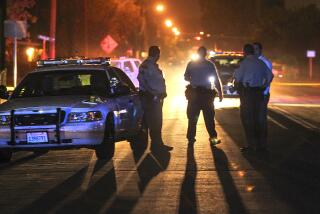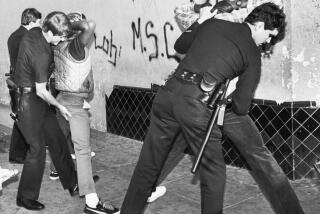Newton: Does secrecy serve the children?
We’re in the second month of a vitally important experiment at the Los Angeles County Dependency Court, where court officers and others are wrestling with what it means to be watched. So far, so good: The public has gotten a look, not one child has been hurt, and awareness is slowly growing.
Taking advantage of the order by Michael Nash, the presiding judge of Juvenile Court, I made another trip recently to the Monterey Park courthouse where Dependency Court is housed. Just a few months ago that would have been unthinkable, as dependency hearings — where the fates of children in the foster care system are decided — were closed except in unusual circumstances. But Nash concluded that the press has a legitimate interest in the goings on of Dependency Court and that reporters should be presumptively allowed to attend proceedings there — that is, they can be excluded only if lawyers object and can convince a judge that a journalist’s presence would create a reasonable likelihood of harm to a child.
The significance of Nash’s order hasn’t entirely sunk in at the courthouse. When I arrived, I was greeted by a surly bailiff who refused to let me so much as sit in the courtroom, and by a lawyer who represents children in the system and who insisted that the press’ right of access does not extend to the “calendar call,” when the judge calls up and dispenses with much of the day’s caseload. Judge Tim Saito ruled otherwise, though. Lawyers in each case on the calendar objected to my presence, but he overruled them every time. I stayed. The bailiff glowered.
What followed was the litany of heartbreaking business that plows through Dependency Court every day: families pulled asunder by drugs and abuse; agonizing decisions about whether to return children to a home where abuse had occurred or leave them separated from parents or siblings.
One case had to be postponed because the father was in Mexico. In another, Saito returned a child to the mother but directed her to attend drug-counseling and domestic-violence classes. “I always see this as an opportunity for a fresh start,” he gently told the young woman. She nodded, trembling a bit and sniffling nervously.
Even with the veil lifted by Nash’s order, secrecy continues to work its mischief in these proceedings. There was, for instance, the complicated case of a man and a woman whose infant daughter was taken from them by the county just days after her birth because the parents had previously been found to have abused their children.
The case has dragged on for years — the little girl is about to turn 2 — and because the whole saga has played out in a closed courtroom, it’s hard to know whom to hold responsible for delays that have resulted in the girl’s spending her entire infancy in limbo. A family is waiting to adopt her but has been unable to while her biological parents fight to get her back.
This protracted contest continued on the day I was in court, as the father briefly appeared before Saito to demand a new lawyer. “Are you dissatisfied with your counsel?” Saito asked. “I’m dissatisfied with the whole court,” he responded.
Secrecy has become routine for Dependency Court, but as this example illustrates, it’s often hard to see whose interests that has served. When the case was called last week, the lawyer for the father moved to have me excluded on the vague grounds that it would intrude on her client’s privacy. But during a break in the proceedings, the father sought me out and complained that privacy has hidden the misdeeds and indifference of social workers and his own lawyers.
“They’re trying to make it seem like we haven’t learned anything from our parenting classes or our domestic-violence classes,” he said. “We don’t have anyone to raise a voice for us.” He said he feels victimized, not protected, by privacy, and he urged me to use his name: It’s Carlton Vereen.
Conversely, secrecy may have protected this father from scrutiny. It came out in court that he’s plowed through lawyers and caused repeated delays without anyone watching. And his actions have postponed resolution of the case — and stability for his daughter — for month after month.
So, if secrecy can be bad for the child and bad for the parents, for whom is it good? Well, it undeniably serves the interests of those whose judgments might be second-guessed. Vereen says his lawyers have done him a disservice, but no one’s been there to watch. The judges who have heard the matter over the years have granted delay after delay while the child’s life goes by. Perhaps they’ve been justified, perhaps not. How would we know? They’re public officials, but in name only, as they do their work outside the reach of public scrutiny.
Last week, Vereen again fired his lawyer, and Saito again granted a delay, so the little girl’s limbo was again extended. The only difference is that this time, a reporter was there to witness it.
Jim Newton’s column appears Mondays. His latest book is “Eisenhower: The White House Years.” Reach him at jim.newton@latimes.com or follow him on Twitter: @newton_jim.
More to Read
A cure for the common opinion
Get thought-provoking perspectives with our weekly newsletter.
You may occasionally receive promotional content from the Los Angeles Times.







